Sailing to safety: UNFPA midwife performs miraculous boat delivery

An Incredible Journey
One morning in July 2021, Zilkee was surprised when a panicked man burst into the health complex.
“A pregnant woman is doing a delivery in a boat. Please come and help her,’’ he yelled.
Zilkee is a midwife in the remote Bandarban District of Bangladesh. The pregnant woman, like many of Zilkee’s patients, lives hours away from the health facility. She had not known her delivery date because she could not travel to the health facility for prenatal check-ups.
Her water had broken earlier that morning. Amidst heavy monsoon rains, she began to travel to the distant health facility with her husband and two neighbors. The group sailed down the river on a small, worn-out fishing boat for two hours until when they reached the hospital. But, once they arrived, the pregnant woman was unable to get up from the boat.
Immediately understanding the severity of the situation, Zilkee rushed to the river with her equipment. As she reached the boat, the baby’s head was beginning to appear. Realizing there was no way the woman could safely be brought to the hospital, Zilkee confidently prepared to perform the delivery on the boat.
The woman gave birth to a healthy baby girl with no complications. She spent the night at the clinic for observation and returned to her village the next day with her husband and newborn daughter.
“I am so happy that I was able to save both a life of a mother and a baby girl today. If I would not have come to the river, the situation could have been really serious. I have never been as proud to call myself a midwife!” Zilkee stated after the delivery.
Overcoming Challenges for Midwives in Bangladesh

“I try to provide maximum support to all the patients, but they live in such remote places that even if they come for one visit they may not be able to come for their next appointment. Pregnant women often have to travel for hours by boat or bike to reach the hospital. And, as the area is poor, they do not always have the money to pay for transportation.”
These are the challenges Zilkee and other midwives in Bandarban face every day. Bandarban is the most remote district in Bangladesh. The region is hilly and prone to landslides and the population is scattered. These factors have hindered the development of infrastructure, like health clinics. In turn, locals have limited access to quality sexual and reproductive health services.
Further, the Bandarban District is home to over a dozen different ethnic groups, each with its own language. As a result, midwives like Zilkee often struggle to communicate with patients. This language barrier is particularly challenging during COVID-19, as people are more reluctant to visit health facilities for checkups and midwives struggle to communicate with patients on the phone.
To keep women, like Zilkee’s patient, safe from deadly complications, UNFPA has been coordinating with local authorities to deploy more midwives in the Bandarban district. Zilkee arrived in the district in June 2021, just one month before her heroic delivery.
Advancing Maternal Health in Bandarban
UNFPA is in pursuit of achieving zero preventable maternal deaths in Bangladesh by 2030. UNFPA works with the government of Bangladesh to ensure that midwifery services are readily available to pregnant women.
The COVID-19 pandemic has made it imperative to improve access to telehealth services, which allow midwives to guide pregnant women remotely. If pregnant women have an idea of how far along they are, they can go to a clinic before they’re in labor. This would prevent incidents like Zilkee’s boat delivery.
The women of Bandarban can remain assured that committed midwives like Zilkee stand ready to perform safe deliveries anywhere, anytime.
UNFPA Bangladesh originally published a version of this story.